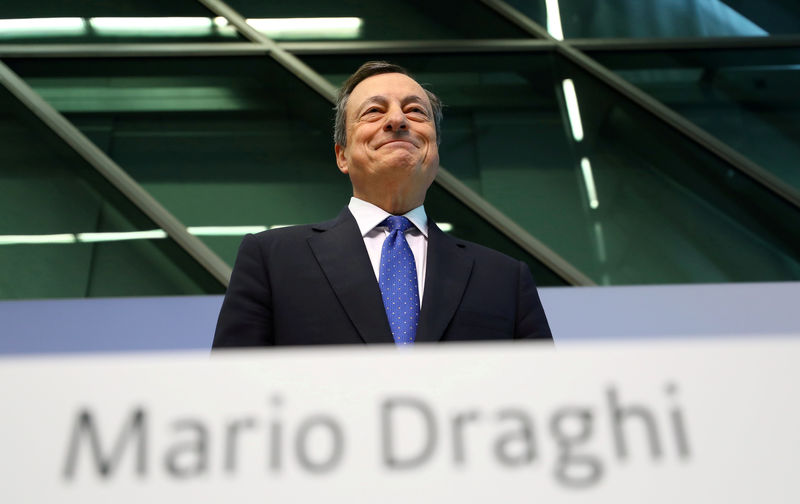By Catherine Evans
LONDON (Reuters) - No big changes are expected from the European Central Bank when it meets on Thursday, but a bit of tweaking may be on the cards.
Policymakers are likely to calibrate the language they use as they edge towards normalizing policy after years of huge post-crisis stimulus.
The bank may drop a reference to its readiness to increase the size or duration of its asset-purchase program before announcing in the autumn how and when it will start winding down its bond-buying.
But after the reaction to his June 27 speech in Sintra, Portugal, hinting at the possibility of changes to the central bank's aggressive stimulus, ECB President Mario Draghi will be wary of sparking another "taper tantrum".
His comments in Sintra sent the euro and bond yields sharply higher, and prompted some rowing back.
"We expect the gradual adjustments in Draghi's communication to continue next week," Nordea analysts said in a note.
"So far the ECB has had an implicit bias towards increasing the size of the asset-purchase program, but this stance could change to a more neutral one, as the ECB will try to smooth the communication path towards the next tapering announcement in the fall."
Noting the nervous response to Draghi's Sintra speech and recent adjustments to the U.S. Federal Reserve's language, they added: "It will be just as interesting to see the market reactions before and after the meeting ... Draghi will need to pave the way for a tapering announcement later on without scaring the bond markets too much."
Half of analysts polled by Reuters now expect the ECB to announce in September that it will gradually wind down its asset buying, a process known as tapering, while a quarter see a one-off reduction and the remainder expect no change. [nL4N1K44AV]
The Sept. 7 meeting will include new inflation and growth forecasts by the ECB's own staff.
Reuters reported on Friday that three sources had said the ECB is reluctant to set a firm date on which asset purchases will fall to zero so it can retain flexibility in case economic variables, particularly wage growth, fall short of expectations. [nL8N1K43T0]
So far, the ECB has said its purchases are intended to run at their current pace until December 2017 "or beyond, if necessary", with a winding-down phase to follow.
INFLATION NOT PLAYING
While euro zone growth is on its best run since the start of the global financial crisis a decade ago and unemployment is falling faster than expected, anemic wage growth continues to anchor inflation well below the ECB's near 2 percent target.
Current forecasts suggest inflation will remain weak at least until the end of 2019.
Analysts at Bank of America Merrill Lynch (NYSE:BAC) said the ECB would increasingly have to distinguish between extraordinary stimulus and regular interest rate policy in its communications, emphasizing waning deflation risks to justify winding down its asset purchases but keeping rates low to reflect weak inflation.
"We think that to further habituate the market to this approach, next week Draghi will need to "assume Sintra", i.e. to continue to prepare the market for tapering -- in practice by removing the easing bias on QE as well -- while making it clear that "patience","persistence" and sustained monetary stimulus will still be needed," they wrote.
Bank of Japan policymakers meet on Wednesday and Thursday and are expected to keep monetary policy settings unchanged, reflecting a gradual economic uptick that is likely to see the bank's growth forecasts revised upwards. [nL4N1K4410]
Trade data on Thursday is expected to show Japanese exports rising for a seventh consecutive month, aided by a weak yen, underpinning the improvement in growth, although feeble inflation will keep the BoJ's stimulus measures in place.

With Bank of England policymakers split over whether to raise interest rates and at least one arguing for its 435 billion pound ($566.85 billion) quantitative easing program to be unwound early, UK inflation figures on Tuesday will be closely scrutinized. [nL8N1K369Y]
Retail sales figures on Thursday should also give an indication of whether consumers, whose wages have not matched a surge in inflation cased largely by the plunge in sterling following last year's Brexit vote, are feeling the squeeze.
($1 = 0.7674 pounds)